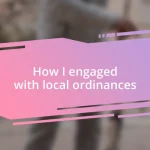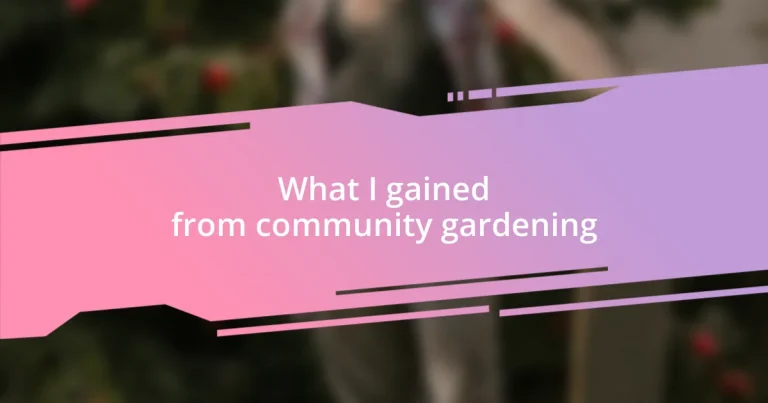Key takeaways:
- Community gardening fosters a profound sense of belonging and connection, transforming strangers into friends through shared experiences.
- Engaging in gardening promotes personal growth, teaching valuable life lessons such as patience, adaptability, and mindfulness.
- Participation in community projects enhances environmental awareness and fosters intergenerational connections, highlighting the importance of nurturing ecosystems and diverse food cultures.
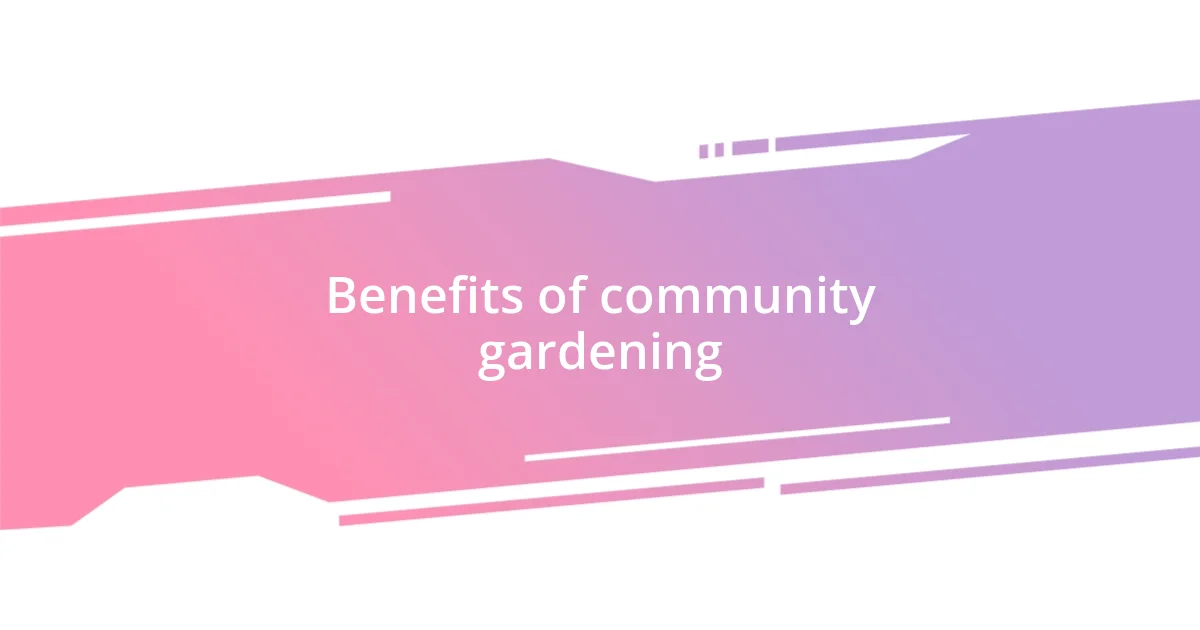
Benefits of community gardening
One of the most profound benefits of community gardening is the sense of belonging it fosters. I remember my first day in the garden; I was a bit nervous, unsure of how I’d fit in. But as I dug my hands into the soil alongside others, we shared stories and laughs. That simple act of gardening transformed strangers into friends, and that connection made every planting season feel like a reunion.
Another significant advantage is the boost in mental health. Tending to plants in a communal space can be incredibly therapeutic. There were days when I felt weighed down by life’s challenges, but just a couple of hours surrounded by greenery and the laughter of fellow gardeners lifted my spirits. Have you ever experienced that rush of joy when you see a tiny seedling pushing through the soil? It’s a reminder of hope and renewal, something we all need sometimes.
Lastly, community gardening promotes food sustainability and healthy eating. By growing our own vegetables, I’ve developed a deeper appreciation for the food on my plate. It’s not just about eating fresh produce; it’s about understanding where it comes from and the effort that goes into nurturing it. Have you ever bitten into a tomato you grew yourself? The flavors are so much richer, making every meal not just nourishing, but also a rewarding experience.
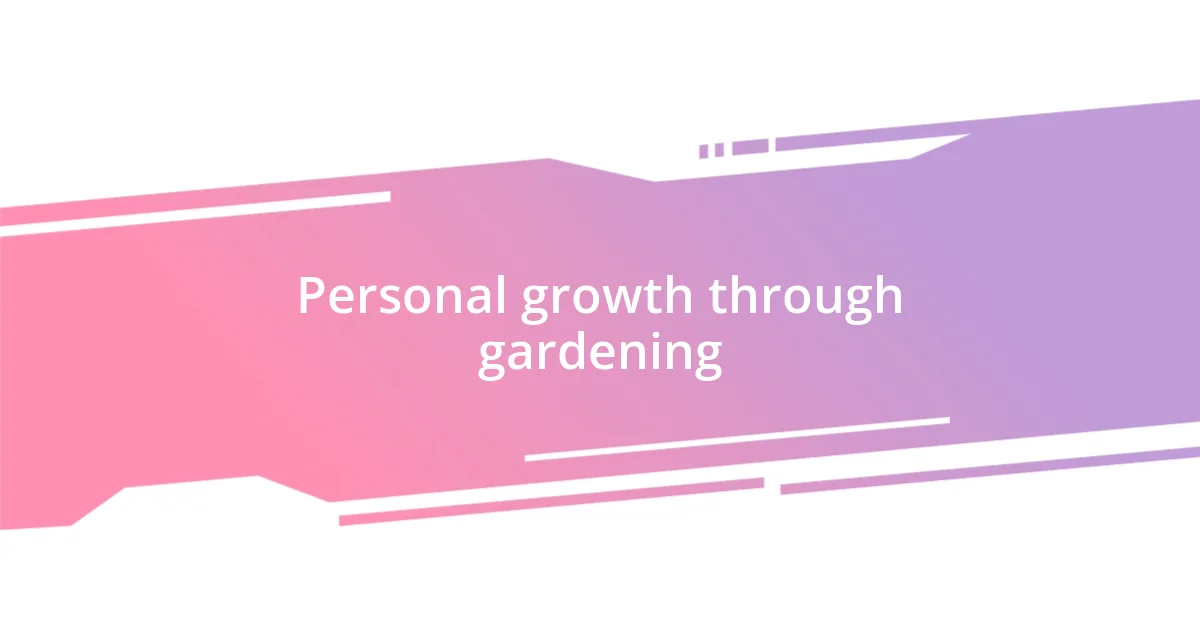
Personal growth through gardening
Gardening has become a journey of self-discovery for me. I’ve found that each time I plant a seed and nurture it, I also nurture parts of myself I didn’t know were lacking. There’s something incredibly empowering about watching those seeds blossom into life. I recall a moment when I faced a particularly difficult week; planting a small herb garden helped me focus on creativity rather than stress. It was during that quiet, intentional work that I realized how my patience was growing alongside my basil and thyme.
Exploring my personal growth through gardening has revealed valuable lessons about resilience and responsibility. The act of caring for something living first instills a sense of duty, but soon it evolves into pure joy. Here’s what I’ve gleaned from my experiences:
- Patience: Waiting for plants to grow teaches me that good things take time.
- Adaptability: I’ve learned to adjust my plans quickly when the weather or pests challenge my efforts.
- Mindfulness: Engaging with nature allows me to be present, a practice that has spilled over into other life areas.
- Confidence: Each small success—whether it’s a single flower blooming or a bountiful harvest—boosts my belief in my abilities.
These lessons stay with me long after I’ve left the garden. They remind me that growth isn’t just about plants; it’s about my own evolution as well.
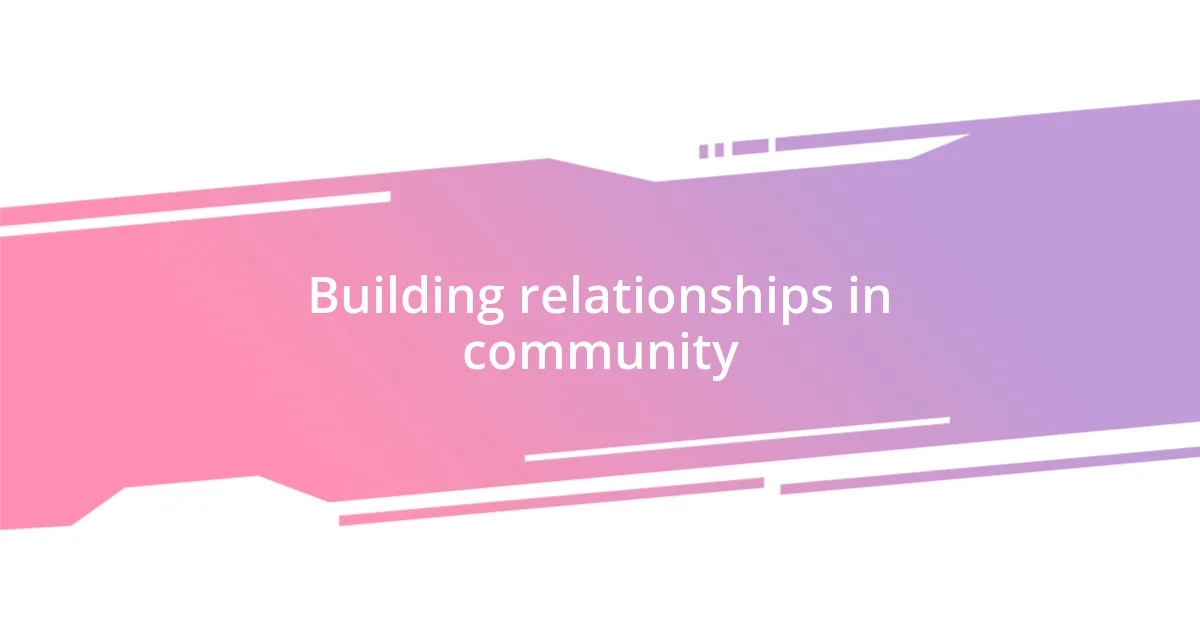
Building relationships in community
Building relationships in a community is one of the most rewarding elements of community gardening. I distinctly remember one Saturday morning when I arrived at the garden early. As I watered the plants, an elderly neighbor named Ruth joined me. We began chatting about our favorite flowers, and before I knew it, we were exchanging recipes. That simple interaction blossomed into a friendship that has enriched my life in countless ways. It’s these everyday moments with fellow gardeners that create a strong sense of belonging.
In my experience, working side by side with others can also reveal shared values and interests. I’ll never forget the time we hosted a potluck after a particularly fruitful harvest. Everyone contributed their home-cooked dishes made from our fresh produce. Sitting together, sharing stories, and savoring our efforts fostered a unique camaraderie. It made me realize that gardening goes beyond just tending to plants; it’s about cultivating relationships and building community bonds that are surprisingly strong.
I’ve seen firsthand how volunteering together brings people from diverse backgrounds together. During one event, we had participants ranging from college students to grandparents, each with something different to offer. I recall one moment when a group of kids taught us creative games to play while we weeded! It was a reminder of the joy that different perspectives bring to shared experiences. The laughter and teamwork made the work feel lighter and drew us closer together, proving that community gardening is an avenue for unity.
| Interaction | Outcome |
|---|---|
| Watering with Ruth | Developed a friendship |
| Harvest potluck | Brought everyone closer |
| Volunteering event | Unity in diversity |
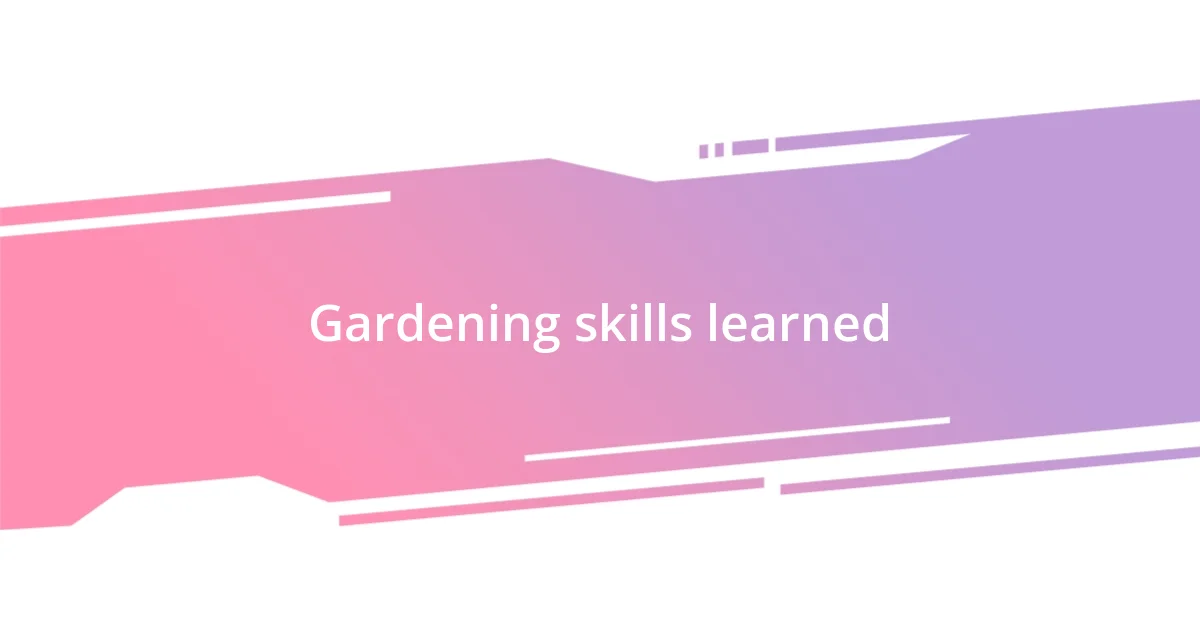
Gardening skills learned
I’ve gained a substantial set of gardening skills that continually enrich my experience. For instance, I remember the first time I tried planting tomatoes. I poured over guides, watched countless videos, and yet, nothing prepared me for the thrill of seeing those first fruits appear. Understanding the intricacies of soil health and sunlight needs became second nature; now, I can discern the subtle signs of pest damage almost instinctively. Isn’t it fascinating how you can learn to read nature’s cues with practice?
One of the most impactful skills I developed is composting. Initially, I wasn’t sure why it was important. What could a pile of kitchen scraps do? As I engaged with my fellow gardeners, I discovered the magic of reducing waste while enriching the soil. Watching the transformation of my compost into rich, black gold felt like a miracle. It made me ponder: how much of our own waste could we transform into something beautiful in other areas of life?
Moreover, I’ve become adept at seed saving, a practice that connects me deeply to the cycles of nature. I recall one afternoon spent with friends, collecting seeds and sharing stories about their origin. It turned into an afternoon rich with laughter and reflection on the importance of heritage in gardening. This simple act of preserving seeds fosters a sense of continuity—what if the seeds we share today become tomorrow’s bountiful harvests? Each handful holds the potential for new memories, and that realization truly elevates my appreciation for the craft of gardening.
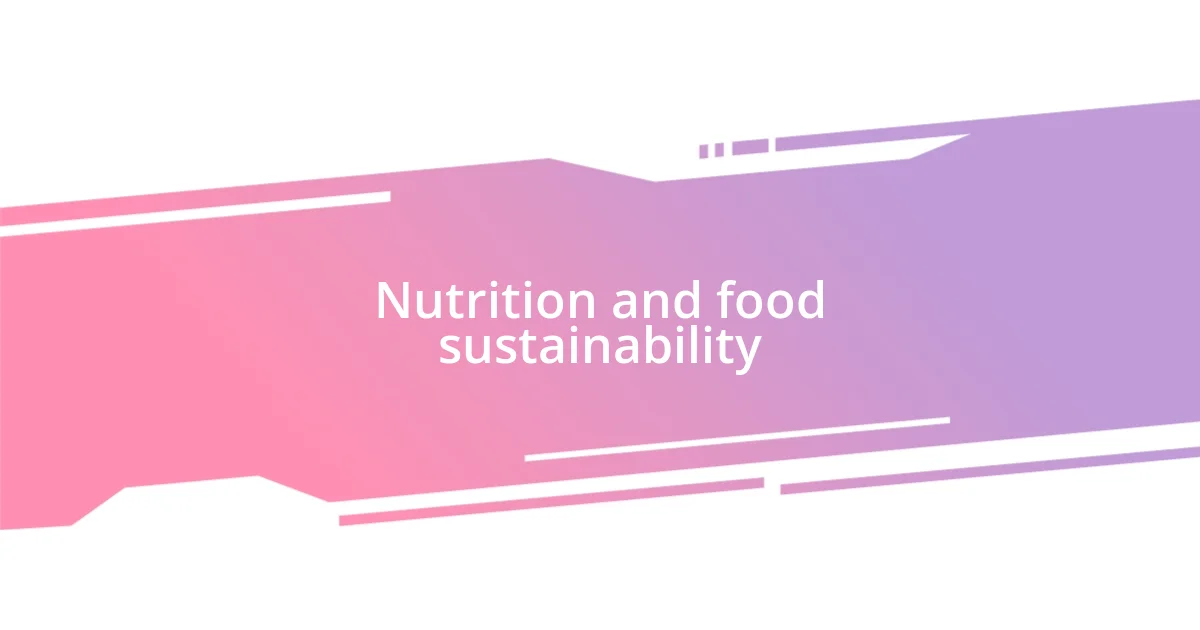
Nutrition and food sustainability
Nutrition and food sustainability have become paramount in my gardening journey, where I’ve discovered the profound impact of growing my own food. I vividly recall the first time I harvested spinach from my plot. The satisfaction of plucking fresh leaves and tossing them into a salad was unlike anything I had experienced before. Eating something I nurtured myself transformed my relationship with food—suddenly, I appreciated not just the taste, but the effort and knowledge that went into growing it.
One aspect of sustainability that resonates deeply with me is the practice of organic gardening. In the beginning, I was skeptical about forgoing chemical fertilizers and pesticides. However, as I embraced this approach, I saw firsthand how it benefits both my health and the environment. I remember a particular season where our group decided to experiment with companion planting, pairing herbs alongside vegetables. The result? A vibrant garden and healthier crops that thrived without harmful chemicals. This experience led me to wonder: how many harmful practices in conventional farming could we replace with natural methods if more of us stepped into the garden?
Additionally, witnessing the diversity of crops our community garden produced was a revelation. I was amazed to learn about heirloom varieties of tomatoes that I had never seen in stores. These unique flavors and colors invited creativity into my cooking. Experimenting with ingredients like purple basil and striped cucumbers not only expanded my palate but also made me ponder the importance of preserving food heritage. This connection to a broader food culture inspired me to share knowledge with others, emphasizing that food sustainability isn’t just about individual gardens—it’s about nurturing ecosystems and communities that celebrate diverse and nutritious foods.
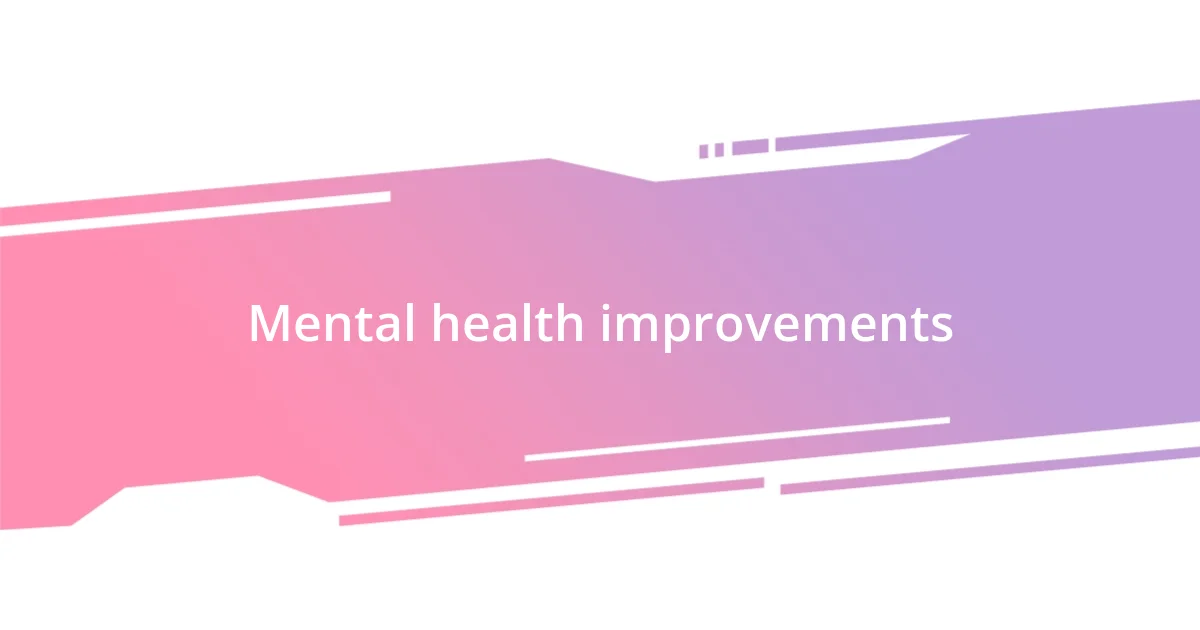
Mental health improvements
I never expected community gardening to have such a profound impact on my mental health. Initially, I joined just to grow food, but I soon found that digging in the soil and tending to plants helped ease my stress. I remember one particularly tough week at work; after spending a few hours in the garden, the weight on my shoulders lifted, and I felt a sense of calm wash over me—a reminder that nature has a soothing power we often overlook.
A unique moment I cherish is when I gathered with fellow gardeners for our weekend meet-up, sharing laughter and stories while sowing seeds. That sense of connection was enriching and, honestly, comforting. I’ve come to realize that community gardening is about more than plants; it’s a sanctuary where anxiety fades, and friendships blossom. What does it feel like to cultivate not just your garden but also your support network? For me, witnessing how we uplifted each other during life’s challenges became a cornerstone of my mental well-being.
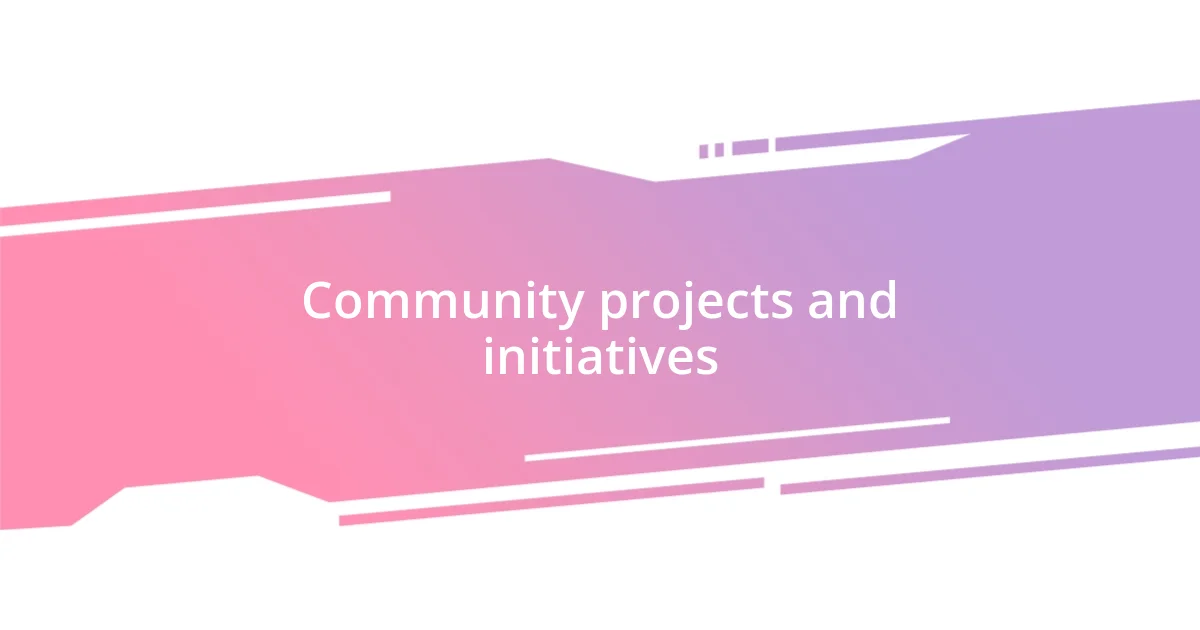
Community projects and initiatives
The sense of camaraderie in community gardening initiatives is something I cherish deeply. I recall an exhilarating day when our group organized a “plant swap,” where everyone brought extra seedlings from their gardens. Swapping tomato varieties and sharing gardening tips not only strengthened our relationships but also fueled our passion for growing. The joy on a gardener’s face when they received a new plant to nurture reminded me of the simple happiness these projects can cultivate among diverse individuals.
Participating in community clean-up events alongside gardening sessions solidified my belief in the bond between projects and initiatives. I vividly remember picking up litter in local parks one Saturday morning before heading back to the garden. The interconnectedness of these activities—making our environment cleaner while nurturing growth—filled me with a sense of purpose. How often do we realize that our small actions in our communities lead to larger ripples of change? I’ve learned that together, we can create vibrant spaces that benefit not just those in the garden but everyone around us.
Community projects have also opened my eyes to the power of outreach. I clearly remember when we hosted a workshop for local children on the importance of gardening and nutrition. Watching their eyes light up as they got their hands dirty was unforgettable. When they asked questions about worms and seedlings, I felt a surge of hope for the future. Isn’t it remarkable how teaching a child about growing food can instill a lifelong appreciation for nature? These moments illuminate the role of community gardening in fostering knowledge, awareness, and connections across generations.




